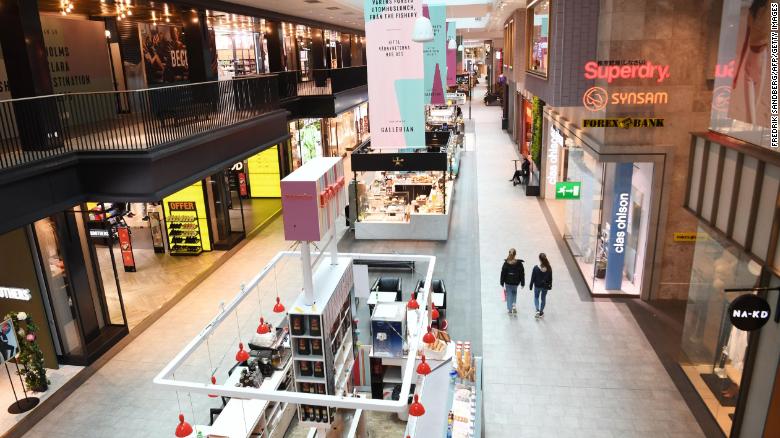begin quote from:
New threat to the economy: Americans are saving like it's the 1980s
New York (CNN Business)Americans are slashing their spending, hoarding cash and shrinking their credit card debt as they fear their jobs could disappear during the coronavirus pandemic.
US credit card debt suddenly reversed course in March and fell by the largest percentage in more than 30 years. At the same time, savings rates climbed to levels unseen since Ronald Reagan was in the White House.
The dramatic shifts in consumer behavior reflect the unprecedented turmoil in the US economy caused by the pandemic. Although caution is a logical response to that uncertainty, hunkering down also poses a risk to the recovery in an economy dominated by consumer spending. A so-called V-shaped recovery can't happen if consumers are sitting on the sidelines.
More than 33 million Americans have filed for initial unemployment claims since mid-March, and economists warn the jobs market won't return to pre-crisis levels for years.
"Consumers are very cautious," said Russell Price, chief economist at Ameriprise Financial. "We're right in the middle of the storm."
'Uncertainty and fear'
The unemployment rate soared to 14.7% in April — the most severe unemployment crisis since the Great Depression — and Americans are bracing for more challenging times ahead.
The perceived probability of losing one's job over the next 12 months soared to nearly 21% in April, according to a New York Federal Reserve survey released Monday. It was the second straight month of a record high for this metric in the survey, which the NY Fed launched in 2013.
Workers are also worried about how they'll land another job if they lose theirs. The perceived probability of finding a job in the next three months tumbled 6.1 percentage points to 47% in April, the largest monthly decline ever recorded.
The survey described "considerable deteriorations" in household expectations, including record lows for expected earnings, income and spending growth.
"We know that Covid has not gone away," said Danielle DiMartino Booth, CEO and chief strategist at Quill Intelligence. "That is going to keep in place an element of uncertainty and fear and hold back consumers' ability or desire to spend."
Credit card debt collapses
Worried Americans are drastically scaling back their credit card debt, the most expensive form of typical borrowing.
In March, revolving credit outstanding collapsed at an annual rate of 31%, according to a Federal Reserve report released last week. It was the largest one-month decline since January 1989.
Part of that drop, economists say, is that banks have pulled back on credit lines as more people become unemployed.
But consumers are also becoming more frugal and reining in their borrowing in case their income is wiped out.
The NY Fed survey found that the perceived probability of missing a minimum debt payment over the next three months rose to 16.2% in April, well above the 12-month trailing average of 11.9%.
"People have seriously reined in their spending. You have to wonder when they will feel comfortable splurging," said Booth.
Savings rate spiked to Reagan-era levels
Credit card borrowing and spending probably declined further in April.
For example, Visa (V) reported that credit card payment volumes plunged 31% through April 28. Visa said the only category of US payments volume that is growing is food and drugstores, along with Walmart (WMT), Costco (COST) and Target (TGT). Spending on everything else was down in April.
Visa has warned that payments volume in the "hardest-hit" categories of travel, fuel, restaurants and entertainment plunged by more than 50% in April. Travel spending collapsed by about 80% last month.
"The consumer that constitutes the beating heart of the real economy is preparing for a much longer slowdown than what policymakers are telling them," said Joe Brusuelas, chief economist at RSM, a consultancy.
For now, Americans are building cash reserves to help them get through the storm.
The savings rate in the United States climbed from 8% in February to 13.1% in March. That was the highest savings rate since November 1981. And given the disastrous economic news, the savings rate will likely go even higher when April statistics are released.
"When you have a depression-like shock, households will increase savings," said Brusuelas, who called the March spike in savings rate "insane."
Main Street is hurting
The shifts in consumer behavior are another reminder of the pain on Main Street that often gets lost given the near-euphoria on Wall Street. The US stock market has raced back to life since late March as investors have celebrated the response from the federal government and signs of hope on the health front.
Although investors are optimistic about the future of the large companies that make up the S&P 500, it's clear that small and medium-sized businesses are hurting badly.
About 83% of middle-market businesses reported a general decline in economic prospects in April, according to a survey released Monday by RSM. And more than half expect a decline in conditions over the next six months. About 46% of executives reported a drop in April hiring and nearly a third noted a decline in compensation being offered.
RSM's middle-market business index collapsed to record lows in April on the bleak findings.
RSM said the survey strongly implies the federal government's stimulus efforts "will not be sufficient to revive the beating heart and soul of the real economy in the near term."
Reopening the economy
Although the shifts in consumer behavior are rational, they point to longer-term challenges for an economy that is dominated by consumer spending, which makes up more than two-thirds of US GDP.
Economists warn that even after stay-at-home orders are lifted, many Americans won't spend as aggressively as before until there is a vaccine. It's not as simple as reopening the economy.
Many consumers, especially senior citizens and those with preexisting conditions, will probably shy away from crowds for the foreseeable future. And that means the economy can't get flipped back on like a light switch.
"Even if you are a multimillionaire, you're going to be much more reluctant to go to restaurants, baseball games and travel on airplanes," Ameriprise's Price said.




















No comments:
Post a Comment